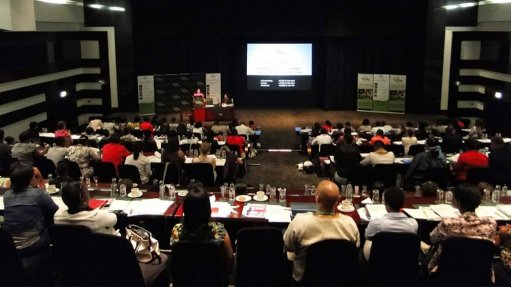
PRESSING ISSUES Mining companies’ compliance with the Mining Charter will take centre stage at the conference
Black-owned training and conferencing company Intelligence Transfer Centre’s (ITC’s) Mineral Resources Compliance and Reporting conference will provide a platform for industry stakeholders to constructively engage with the Department of Mineral Resources (DMR), says ITC conference director Ankia Roux.
She tells Mining Weekly that registration for the conference has opened and it will take place at the Indaba Hotel, in Fourways, Johannesburg, from August 20 to 21.
Roux adds that delegates can look forward to hearing about the ways in which mining companies are trying to fulfil their legal and social obligations, as well as proposals regarding the ways in which the industry can be transformed.
Legal experts from leading local law firms, such as Hogan Lovells’ Warren Beech, Webber Wentzel’s Peter Leon, Werksmans Attorneys’ Chris Stevens and Bowman Gilfillan’s Sanusha Govender will deliver presentations.
“They will discuss the changes and implications . . . of the amendments made to the Mineral and Petroleum Resources Development Act (MPRDA), recent legal cases and others laws enacted that impact on the local mining industry.”
Additionally, Roux notes that mining companies’ compliance with the Mining Charter will take centre stage at the conference.
In May, the Mining Industry Growth Development and Employment Task Team, led by Mineral Resources Minister Advocate Ngoako Ramatlhodi, found that, on a weighted basis, only 20% of the mining industry could be deemed to provide “meaningful economic participation” by way of inclusion of historically disadvantaged South African’s in empowerment schemes.
This prompted the Chamber of Mines to approach the High Court for a declaratory order to provide guidance on the principles applicable to the assessment of ownership as called for by the Mining Charter, particularly in respect of the continuous consequences of previous black economic-empowerment deals.
Roux also points out that the DMR plans to spend about R4.1-billion, or 81.4% of its total budget for enforcing compliance with legislation and promoting sustainable resource use and management over the course of its current medium-term expenditure framework budget, thus emphasising the importance the department places on compliance.
However, she says the conference will enable mining companies and other stakeholders to present their concerns about the legislative uncertainties to DMR officials.
“The DMR also wants to assist companies that might be struggling to meet industry compliance requirements and intends to use the platform provided by the conference to actively assist such companies to the best of their ability,” states Roux.
Additionally, black-owned equity investor Simang Group and platinum development company Wesizwe Platinum will showcase practical examples of the ways in which they have achieved compliance with the MPRDA and the Mining Charter respectively.
Roux also highlights that information technology company Spatial Dimension CE Bill Feast will present a session on whether a mining cadastre system will improve South Africa’s investment climate.